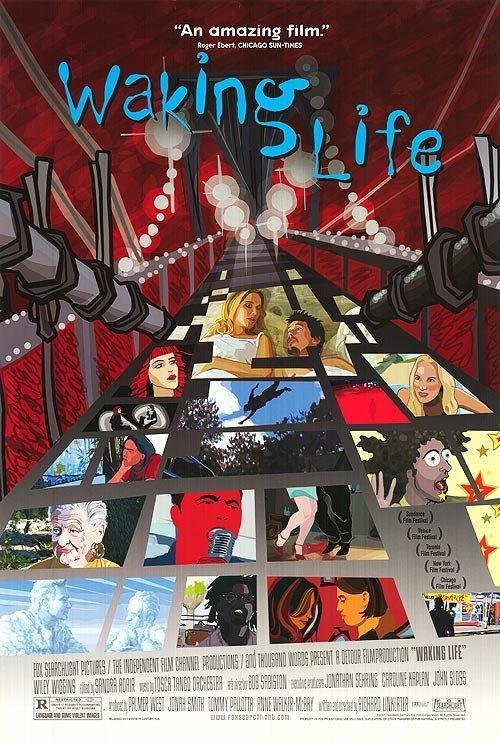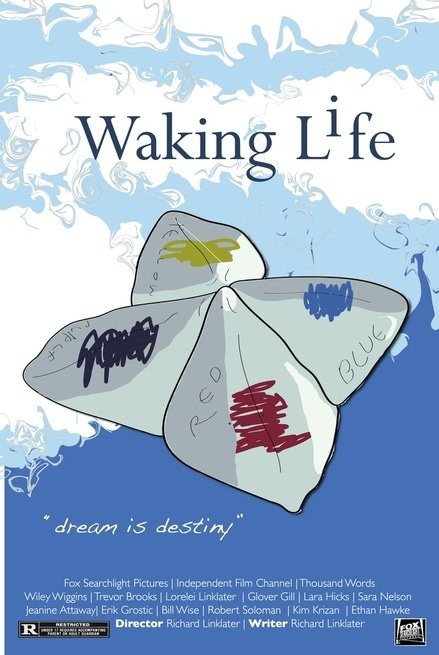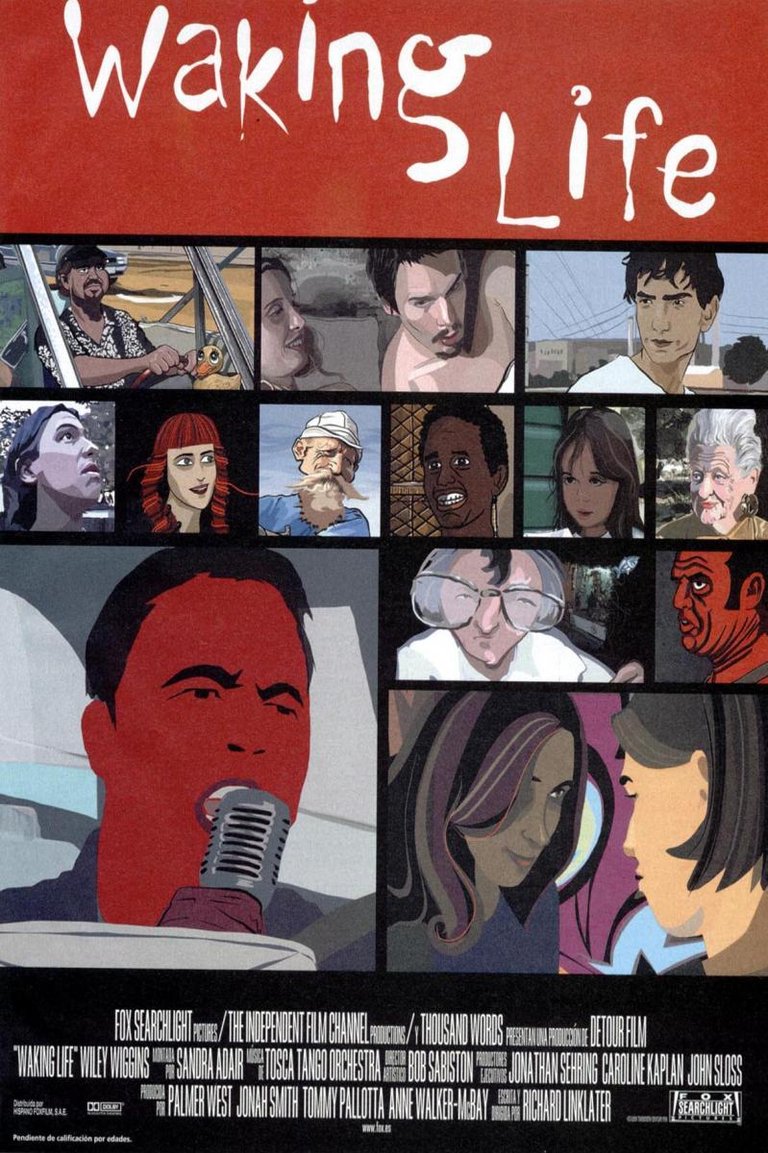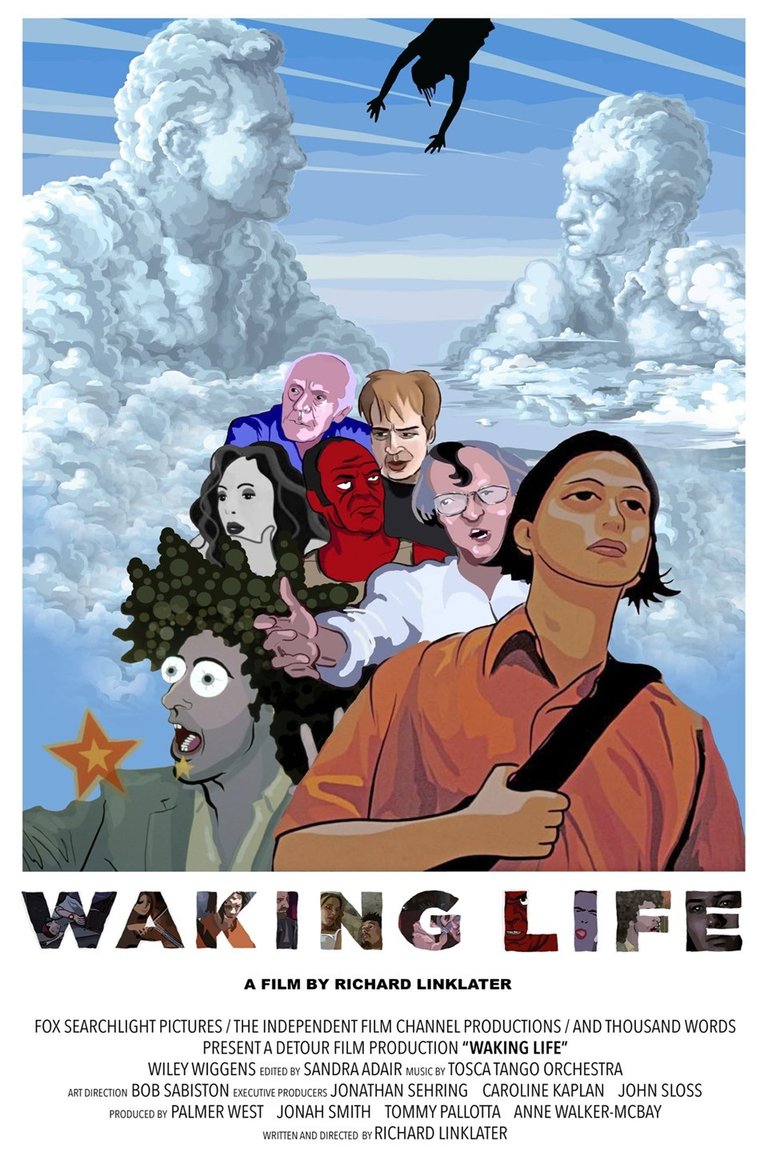Waking Life (2001): deeply philosophical | profudnamente filosófica
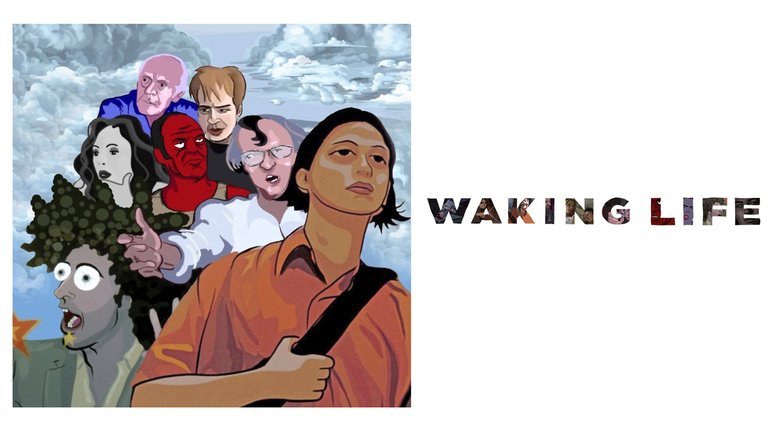
Escrita y dirigida por Richard Linklater
Richard Linklater is responsible for having written and directed films as different as School of Rock, the acclaimed Boyhood and the recent Hitman with Glenn Powell and Adria Arjona, and although I saw the first of those three, in my mind and deep in my soul is eternal gratitude to this director for another of his creations that I have seen several times: the beautiful Before trilogy, starring Ethan Hawke and Julie Delpy.
Richard Linklater es el responsable de haber escrito y dirigido películas tan diferentes como School of Rock, la aclamada Boyhood y la reciente Hitman con Glenn Powell y Adria Arjona, y aunque vi la primera de esas tres, en mi mente y en lo profundo de mi ser hay un agradecimiento eterno a este director por otra de sus creaciones que he visto varias veces: la hermosa trilogía Before, protagonizada por Ethan Hawke y Julie Delpy.
That's why I had known for a while about the existence of Waking Life, but I only had the information that it was by Linklater and that it was an animated film, nothing more. To put it in a few words, which in this case is challenging, the film follows the story of an anonymous young man who is a witness and protagonist of different philosophical discussions over the course of just over ninety minutes. At first it is not clear if the young man is remembering, dreaming, living or imagining these talks, some of which are more monologues than dialogues, where any person can express their point of view regarding a theory, a concept, an anecdote or almost anything. Topics such as reality and appearance, free will, love, reincarnation, existentialism, politics, violence, our relationships with others, concepts as current as artificial intelligence or neo-humans, consciousness and the meaning of life, are just some of the topics that are stated in this film in a profound way although, in some cases, insufficiently, not because the film disdains them but because they are such complex topics and generate so much interest that we would probably like to dedicate more than an hour and a half to each one of them. From a visual point of view, the film presents simple animation, perhaps not very polished; From a plot point of view, there is none; What really stands out is the content of the script, the background of all those conversations.
Por eso ya sabía desde hacía un tiempo de la existencia de Waking Life, pero sólo tenía el dato de que era de Linklater y de que se trataba de una cinta animada, nada más. Para decirlo en pocas palabras, lo que en este caso resulta desafiante, la cinta sigue la historia de un joven anónimo que es testigo y protagonista de diferentes discusiones filosóficas a lo largo de poco más de noventa minutos. Al principio no queda claro si el joven está recordando, soñando, viviendo o imaginando estas charlas, algunas de las cuales son más monólogos que diálogos, en donde una persona cualquiera puede exponer su punto de vista respecto a una teoría, un concepto, una anécdota o casi cualquier cosa. Temas como realidad y apariencia, libre albedrío, el amor, la reencarnación, existencialismo, política, violencia, nuestras relaciones con otros, conceptos tan vigentes como la inteligencia artificial o los neo-humanos, la consciencia y el significado de la vida, son apenas algunos de los tópicos que son enunciados en esta película de manera profunda aunque, en algunos casos, insuficiente, no porque la cinta los desdeñe sino porque son temas tan complejos y generan tanto interés que probablemente nos gustaría dedicarles más de una hora y media a todos y cada uno de ellos. Desde el punto de vista visual, la película presenta una animación sencilla, no muy pulida tal vez; desde el punto de vista de la trama, no hay ninguna; lo verdaderamente destacado es el contenido del guión, el fondo de todas esas conversaciones.
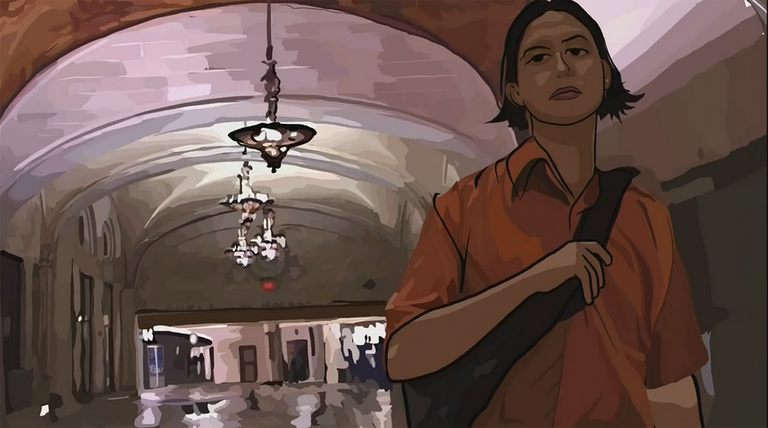
The film features Eamonn Healy, Timothy "Speed" Levitch, Adam Goldberg, Nicky Katt, Otto Hofmann, Richard Linklater himself, Steven Soderbergh and many others, in most cases playing themselves. I could only recognize two interventions from other fiction and they are the appearances of Ethan Hawke as Jesse and Julie Delpy as Céline, their characters in the previously mentioned trilogy, and I was grateful to see a scene from their lives that is not in the other films and that combines the intimacy of a bedroom with the depth of their connection.
En la película aparecen Eamonn Healy, Timothy "Speed" Levitch, Adam Goldberg, Nicky Katt, Otto Hofmann, el propio Richard Linklater, Steven Soderbergh y muchos otros, en la mayoría de los casos interpretándose a sí mismos. Sólo pude reconocer dos intervenciones de otra ficción y son las apariciones de Ethan Hawke como Jesse y Julie Delpy como Céline, sus personajes en la trilogía mencionada previamente, y agradecí ver una escena de sus vidas que no está en las otras películas y que combina la intimidad de un dormitorio con la profundidad de su conexión.
The mix of philosophy and animation reminded me of The Midnight Gospel, a series I watched on Netflix last year. Unlike that one, I didn't find the animation of Waking Life as stimulating or distracting and I think the reason is because Linklater's film was filmed with real people first and then it was animated with simple tools and equipment not very advanced computing devices (remember that the tape dates back to 2001). However, both are similar in the depth of their themes and - in my opinion - in the insufficiency of their format. If an episode of The Midnight Gospel of about twenty minutes seemed insufficient to cover one topic, what can we say about an hour and a half film that wants to cover dozens of them? The idea that occurs to me to get the most out of the film and Linklater's script is to break down the film into all the conversations and monologues and pause it after each of them to think about the topics, discuss them with friends and digest them a bit for a couple of days, before continuing to watch the rest of Waking Life, dialogue by dialogue. It may seem like an eccentricity or a very long project, but for a film by a director who took twelve years to film a story (Boyhood) because he wanted to show the real growth of his characters, it seems poetically appropriate to me.
La mezcla de filosofía y animación me hizo recordar The Midnight Gospel, una serie que vi en Netflix el año pasado. A diferencia de ella, la animación de Waking Life no me resultó tan estimulante ni distractora y creo que la razón es porque la película de Linklater fue grabada con personas reales primero y luego fue animada con herramientas sencillas y en equipos de computación no muy avanzados (recordemos que la cinta data del año 2001). Sin embargo, ambas se parecen en la profundidad de sus temas y - en mi opinión - en la insuficiencia de su formato. Si un episodio de The Midnight Gospel de unos veinte minutos parecía poco para abarcar un tema, ¿qué decir de una película de hora y media que quiere abarcar decenas de ellos? La idea que se me ocurre para sacarle el mayor provecho posible a la película y al guión de Linklater es desglosar la cinta en todas las conversaciones y monólogos y pausarla después de cada uno de ellos para darle vueltas a los temas, conversarlos con amigos y digerirlos un poco durante un par de días, antes de continuar viendo el resto de Waking Life, diálogo a diálogo. Puede parecer una excentricidad o un proyecto muy prolongado, pero tratándose de una película de un director que tardó doce años en filmar una historia (Boyhood) porque quería mostrar el crecimiento real de sus personajes, me parece poéticamente apropiado.
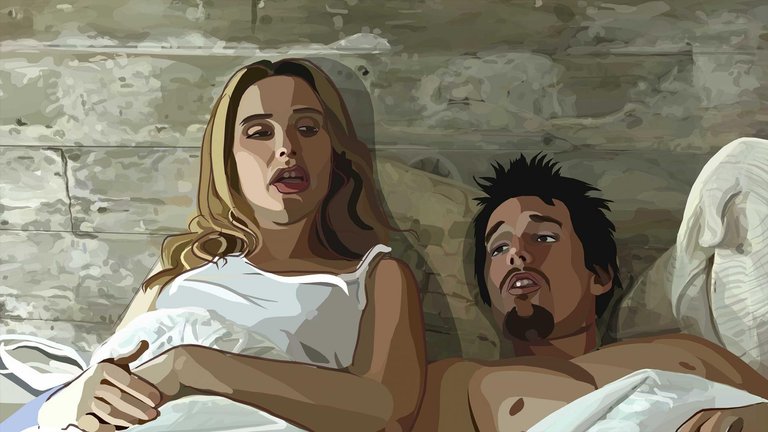
Waking Life is not a drama, nor a comedy, but something different that encompasses that and much more. It's an adult animated movie that literally feels like a dream within a dream within a dream... is life a lucid dream? Are dreams part of our reality? These are just two questions that one can ask from the film whose first sentences include another gem: "Dream is destiny".
Waking Life no es un drama, ni una comedia, sino algo distinto que abarca eso y mucho más. Es una película animada para adultos que se siente literalmente como un sueño dentro de un sueño dentro de un sueño... ¿es la vida un sueño lúcido? ¿son los sueños parte de nuestra realidad? Son apenas dos interrogantes que puede uno plantearse a partir de la cinta entre cuyas primeras frases está otra perla: "Dream is destiny".
Despite its virtues, it's difficult to recommend films like this because the viewer may find themselves faced with many self-imposed barriers: they do not like animated films because they are for children; they want to see something simple and light because reality in itself is already complicated; they just want to relax and watch something that doesn't make them think... this movie is not for those types of people. It also doesn't mean you have to be a philosophy student or an existentialist poet to enjoy Waking Life. It is enough that you are a thinking, feeling human being, intrigued with your origin and your destiny, with death, free will, the meaning of life (or the search for it), of those who long for a deep conversation in front of a cup of coffee or walking through a park on a warm autumn afternoon and - wonderful treasure - when they manage to have one, they enjoy it and make the most of it to get every drop of life and reflection they can out of it. If you are that type of person, you like to read, think about questions that do not have a single answer or have an infinite number of them, if you like, in a word, philosophizing, then yes, I recommend you watch Waking Life that will make you see with different eyes not only reality, but also dreams, have you turned off a light or read a book in a dream? I bet now you'll want to give it a try... have any of you seen this movie? I read you in the comments.
A pesar de sus virtudes resulta difícil recomendar películas como esta porque el espectador puede encontrarse en frente de sí con muchas barreras autoimpuestas: que si no le gustan las películas animadas porque son para niños; que si quiere ver algo sencillo y ligero porque la realidad en sí misma ya es complicada; que si sólo quiere relajarse y ver algo que no le haga pensar... esta película no es para ese tipo de personas. Tampoco significa que debas ser un estudiante de filosofía o un poeta existencialista para disfrutar de Waking Life. Basta con que seas un ser humano pensante, sintiente, intrigado con su origen y su destino, con la muerte, el libre albedrío, el significado de la vida (o la búsqueda del mismo), de esos que anhelan una conversación profunda frente a una taza de café o caminando por un parque en una cálida tarde de otoño y que - maravilloso tesoro - cuando logran tener una, la disfrutan y la exprimen al máximo para sacar de ella cada gota de vida y reflexión que puedan. Si eres de ese tipo de personas, te gusta leer, pensar en preguntas que no tienen una única respuesta o tienen infinidad de ellas, si te gusta, en una palabra, filosofar, entonces sí, te recomiendo ver Waking Life que te hará ver con otros ojos no sólo la realidad, sino también los sueños, ¿has apagado una luz o leído un libro dentro de un sueño? Apuesto a que ahora querrás a intentarlo... ¿alguno de ustedes ha visto esta película? Los leo en los comentarios.
Reseñado por @cristiancaicedo
Other posts that may interest you | Otros posts que pueden interesarte:
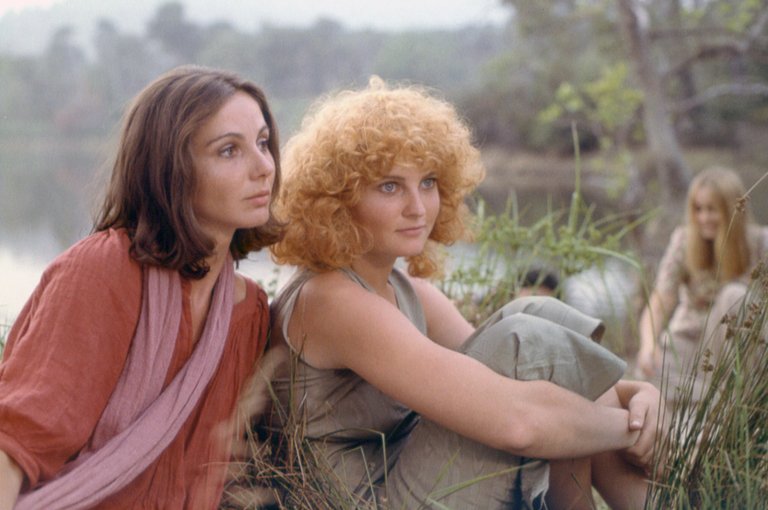 |
|---|
